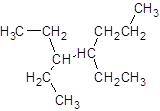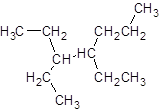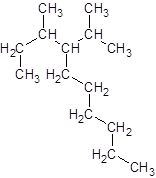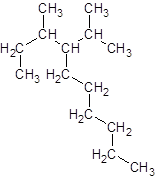
Interpretation:
The molecular structure of 3, 4-diethylheptane needs to be drawn.
Concept introduction:
The hydrocarbon compounds that contains single bond(s) between carbon atom(s) are said to be saturated hydrocarbon. Hydrocarbon compounds containing single bonds only are said to be
Answer to Problem 15SSC

Explanation of Solution
Alkanes are compounds containing carbon and hydrogen atoms having single bond(s) between carbon atom(s) in the structure. For number of carbons atoms in alkane chain, the prefix is given as:
Carbon-1 meth
Carbon-2 eth
Carbon-3 prop
Carbon-4 but
Carbon-5 pent
Carbon-6 hex
Carbon-7 hept
Carbon-8 oct
Carbon-9 non
Carbon-10 dec
The numbering of the carbon chain is done in such a way that substituents gets lower number.
The given name is 3, 4-diethylheptane that means the parent chain has 7 number of carbons in the chain and -diethyl represents the presence of two ethyl substituents at position 3 and 4. So, the structure of 3, 4-diethylheptane is:

Interpretation:
The molecular structure of 4-isopropyl-3-methyldecane needs to be drawn.
Concept introduction:
The hydrocarbon compounds that contains single bond(s) between carbon atom(s) are said to be saturated hydrocarbon. Hydrocarbon compounds containing single bonds only are said to be alkane.
Answer to Problem 15SSC

Explanation of Solution
The given name is 4-isopropyl-3-methyldecane that means the parent chain has 10 number of carbons in the chain and -isopropyl represents the presence of isopropyl substituent at position 4 and -methyl substituent at position 3. So, the structure of 4-isopropyl-3-methyldecane is:

Interpretation:
The structure of 1-ethyl-4-methylcyclohexane needs to be drawn.
Concept introduction:
When the carbon atoms of hydrocarbons are arranged in such a way that it results in the formation of ring then it is said to be cycloalkanes.
Answer to Problem 15SSC

Explanation of Solution
The given name is 1-ethyl-4-methylcyclohexane that means the parent chain contains cyclic ring of 6 carbon atoms and -ethyl represents the presence of ethyl substituent at position 1 and -methyl substituent at position 4. So, the structure of 1-ethyl-4-methylcyclohexane is:

Interpretation:
The structure of 1, 2-dimethylcyclopropane needs to be drawn.
Concept introduction:
When the carbon atoms of hydrocarbons are arranged in such a way that it results in the formation of ring then it is said to be cycloalkanes.
Answer to Problem 15SSC

Explanation of Solution
The given name is 1, 2-dimethylcyclopropane that means the parent chain contains cyclic ring of 3 carbon atoms and -dimethyl represents the presence of 2 methyl substituent at position 1 and 2. So, the structure of 1, 2-dimethylcyclopropane is:

Chapter 21 Solutions
Chemistry: Matter and Change
Additional Science Textbook Solutions
Essential Organic Chemistry (3rd Edition)
Chemistry: Structure and Properties (2nd Edition)
Introductory Chemistry (6th Edition)
Organic Chemistry
Chemistry: A Molecular Approach (4th Edition)
General, Organic, and Biological Chemistry (3rd Edition)
 ChemistryChemistryISBN:9781305957404Author:Steven S. Zumdahl, Susan A. Zumdahl, Donald J. DeCostePublisher:Cengage Learning
ChemistryChemistryISBN:9781305957404Author:Steven S. Zumdahl, Susan A. Zumdahl, Donald J. DeCostePublisher:Cengage Learning ChemistryChemistryISBN:9781259911156Author:Raymond Chang Dr., Jason Overby ProfessorPublisher:McGraw-Hill Education
ChemistryChemistryISBN:9781259911156Author:Raymond Chang Dr., Jason Overby ProfessorPublisher:McGraw-Hill Education Principles of Instrumental AnalysisChemistryISBN:9781305577213Author:Douglas A. Skoog, F. James Holler, Stanley R. CrouchPublisher:Cengage Learning
Principles of Instrumental AnalysisChemistryISBN:9781305577213Author:Douglas A. Skoog, F. James Holler, Stanley R. CrouchPublisher:Cengage Learning Organic ChemistryChemistryISBN:9780078021558Author:Janice Gorzynski Smith Dr.Publisher:McGraw-Hill Education
Organic ChemistryChemistryISBN:9780078021558Author:Janice Gorzynski Smith Dr.Publisher:McGraw-Hill Education Chemistry: Principles and ReactionsChemistryISBN:9781305079373Author:William L. Masterton, Cecile N. HurleyPublisher:Cengage Learning
Chemistry: Principles and ReactionsChemistryISBN:9781305079373Author:William L. Masterton, Cecile N. HurleyPublisher:Cengage Learning Elementary Principles of Chemical Processes, Bind...ChemistryISBN:9781118431221Author:Richard M. Felder, Ronald W. Rousseau, Lisa G. BullardPublisher:WILEY
Elementary Principles of Chemical Processes, Bind...ChemistryISBN:9781118431221Author:Richard M. Felder, Ronald W. Rousseau, Lisa G. BullardPublisher:WILEY





